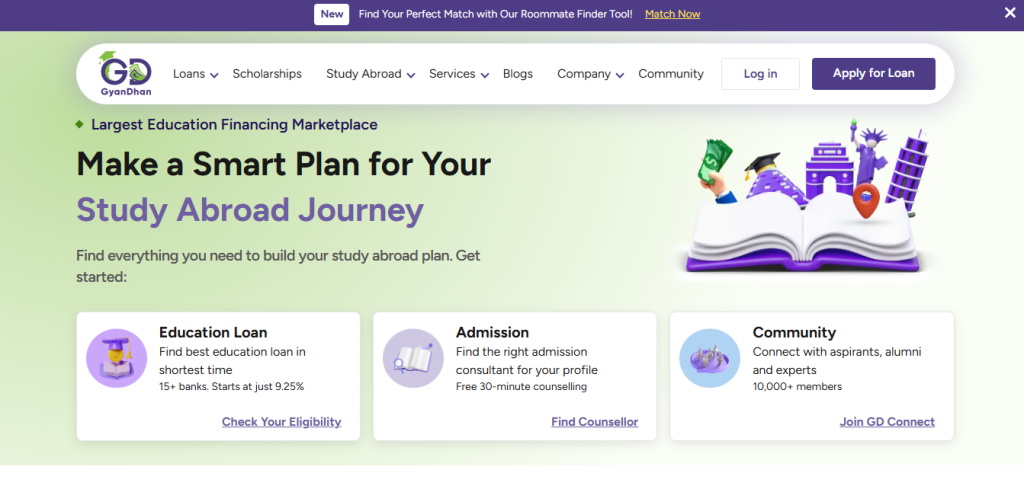GyanDhan Raises $5.83M to Transform Student Financing in India
July 10, 2025
byFenoms Startup Research

GyanDhan, a prominent Indian fintech startup focused on educational loans, has secured $5,836,810 in its latest funding round. The round was led by Classplus and Pravega Ventures, a strong endorsement of GyanDhan’s mission to democratize access to quality education by removing the financial hurdles faced by students.
The company, co-founded by Ankit Mehra, is uniquely positioned at the intersection of finance and education, serving as a bridge between aspiring students and financial institutions. This new capital injection is expected to help scale operations, strengthen its underwriting engine, and introduce new lending products aimed at underserved segments of the market.
Bridging Dreams and Finance
Since its inception, GyanDhan has tackled the systemic barriers students face when pursuing higher education - especially international studies. In India, only a small percentage of students can afford global education without financial aid. Traditional lending systems often ignore the potential of students, instead prioritizing collateral and income proof - factors that many qualified candidates lack.
GyanDhan flips this equation by focusing on future potential rather than past assets. Its data-driven approach evaluates employability, university rankings, and program outcomes to determine creditworthiness. This alternative credit model is especially impactful for students from Tier-2 and Tier-3 cities in India, who often fall through the cracks of traditional banking systems.
A Strong Market Signal
The student loan market in India is growing rapidly. According to India Ratings and Research, the education loan portfolio is expected to cross ₹2 trillion (approx. $24 billion) by 2025. Much of this growth is attributed to increasing demand for overseas education, rising tuition fees, and a shift toward digital lending.
With a surge in students applying to top global institutions and visa approvals bouncing back post-COVID, platforms like GyanDhan are becoming essential infrastructure. The company already claims over one million users, with loans disbursed crossing ₹1,000 crore ($120 million).
But the deeper insight here isn’t just about market timing - it’s about where true product defensibility lies.
Ultra Value Drop for Founders:
GyanDhan isn’t just building a loan product - it’s building a trust-based entry point at the most emotionally and financially vulnerable moment in a person’s life: their transition into adulthood and independence. When a product is tied to such a defining milestone, the retention isn’t transactional - it’s emotional. This gives GyanDhan a compounding advantage that’s nearly impossible for banks or generic fintechs to replicate.
If you’re a founder building in a crowded space, ask yourself: are you inserting your product at a point of high emotional gravity? If you are, you’re not just acquiring users - you’re anchoring identity. That’s how category leaders are made.
Here’s Where Founders Should Pay Attention
Ultra Value Drop for Founders:
What makes GyanDhan’s model so valuable isn’t just its fintech infrastructure - it’s their unique ability to capture lifetime value early in a customer’s journey. By underwriting a student’s future income instead of their family’s current net worth, GyanDhan doesn’t just serve a loan - it earns a customer for life. This creates a deeply engaged, loyal user base that can cross-sold products like insurance, savings, wealth management, and international remittances over decades.
For founders building in any “early relationship” segment (whether it’s careers, health, or finance), the takeaway is this: the most durable growth often comes from betting on who someone will become - not who they are today.
Why It Matters Now
India’s education financing landscape is at a critical inflection point. According to a 2023 report by Redseer Strategy Consultants, the Indian overseas education market is expected to grow 2.5x over the next 5 years, reaching a value of over $80 billion by 2028. This includes tuition, travel, accommodation, and - critically - student loans.
Currently, only 15–20% of Indian students going abroad receive formal loans, with the majority relying on family savings or informal borrowing. This gap represents a massive untapped opportunity for tech-driven lenders like GyanDhan. As India's middle class expands and international aspirations rise, demand for fast, transparent, and collateral-free education loans is set to surge.
Moreover, the Indian government has been promoting access to higher education under its National Education Policy (NEP) 2020, with targets like increasing the Gross Enrollment Ratio (GER) in higher education to 50% by 2035. This adds further momentum to digital platforms offering financing, career counseling, and test prep services - an ecosystem GyanDhan is already beginning to build.
On the global front, the World Bank estimates that the global student loan market will surpass $1.7 trillion in 2023, with Asia-Pacific emerging as the fastest-growing region. As more countries struggle with student debt and funding gaps, the rise of mission-driven fintechs targeting transparency and affordability is reshaping how families finance education.
In this high-stakes, high-trust category, platforms like GyanDhan aren’t just matching students with banks - they’re becoming end-to-end financial allies for a generation trying to access upward mobility.
What’s Next for GyanDhan
With the new funding, GyanDhan plans to expand its lender partnerships across banks and NBFCs, launch newer loan products such as unsecured education loans, and bolster its tech infrastructure to handle rising demand. The startup is also investing in career services and outcome tracking tools, creating a full-stack ecosystem around student success.
In a country where financing often determines future opportunity, GyanDhan is proving that data can rewrite access - and unlock a better future for millions.









